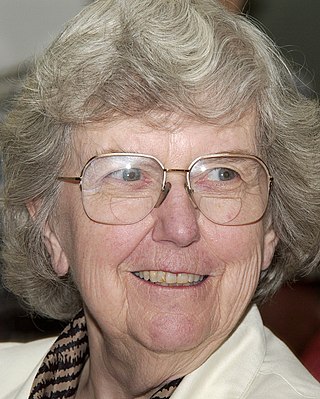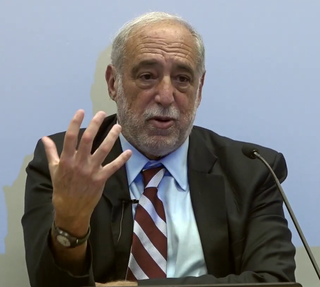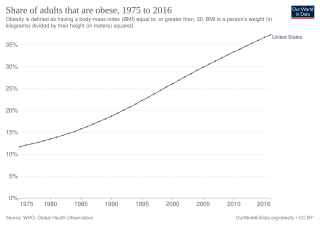Related Research Articles

Pediatrics is the branch of medicine that involves the medical care of infants, children, adolescents, and young adults. In the United Kingdom, paediatrics covers many of their youth until the age of 18. The American Academy of Pediatrics recommends people seek pediatric care through the age of 21, but some pediatric subspecialists continue to care for adults up to 25. Worldwide age limits of pediatrics have been trending upward year after year. A medical doctor who specializes in this area is known as a pediatrician, or paediatrician. The word pediatrics and its cognates mean "healer of children", derived from the two Greek words: παῖς and ἰατρός. Pediatricians work in clinics, research centers, universities, general hospitals and children's hospitals, including those who practice pediatric subspecialties.
The American Academy of Pediatrics (AAP) is the largest professional association of pediatricians in the United States. It is headquartered in Itasca, Illinois, and maintains an office in Washington, D.C. The AAP has published hundreds of policy statements, ranging from advocacy issues to practice recommendations.

CHEO, formerly the Children's Hospital of Eastern Ontario, is a children's hospital and pediatric research centre located in Ottawa, Ontario, Canada. CHEO is also a tertiary trauma centre for children in Eastern Ontario, Nunavut, Northern Ontario and the Outaouais region of Quebec and one of only seven Level I trauma centres for children in Canada. It is affiliated with The Ottawa Hospital and the University of Ottawa, and is funded by the provincial Government of Ontario. CHEO first opened its doors on May 17, 1974, and is located at 401 Smyth Road, Ottawa, Ontario.

Arkansas Children's Hospital (ACH) is a pediatric hospital with a Level I trauma center in Little Rock, Arkansas. It is among the largest in the United States, serving infants, children, teens, and young adults from birth to age 21. ACH is affiliated with the University of Arkansas for Medical Sciences and serves as a teaching hospital with the UAMS College of Medicine's Department of Pediatrics. ACH staff consists of more than 505 physicians, 200 residents, and 4,400 support staff. The hospital includes 336 licensed beds, and offers three intensive care units. The campus spans 36 city blocks and has a floor space of over 1,200,000 square feet (110,000 m2).

Childhood obesity is a condition where excess body fat negatively affects a child's health or well-being. As methods to determine body fat directly are difficult, the diagnosis of obesity is often based on BMI. Due to the rising prevalence of obesity in children and its many adverse health effects it is being recognized as a serious public health concern. The term overweight rather than obese is often used when discussing childhood obesity, as it is less stigmatizing, although the term overweight can also refer to a different BMI category. The prevalence of childhood obesity is known to differ by sex and gender.

A growth chart is used by pediatricians and other health care providers to follow a child's growth over time. Growth charts have been constructed by observing the growth of large numbers of healthy children over time. The height, weight, and head circumference of a child can be compared to the expected parameters of children of the same age and sex to determine whether the child is growing appropriately. Growth charts can also be used to predict the expected adult height and weight of a child because, in general, children maintain a fairly constant growth curve. When a child deviates from his or her previously established growth curve, investigation into the cause is generally warranted. Parameters used to analyze growth charts include weight velocity, height velocity, and whether someone's growth chart crosses percentiles. For instance, endocrine disorders can be associated with a decrease in height velocity and preserved weight velocity while normal growth variants are associated with a decrease in height and weight velocity that are proportional to each other. It's important to note that other parameters are more commonly used such as waist circumference for assessing obesity and skin fold difference for assessing malnutrition. Growth charts can also be compiled with a portion of the population deemed to have been raised in more or less ideal environments, such as nutrition that conforms to pediatric guidelines, and no maternal smoking. Charts from these sources end up with slightly taller but thinner averages.

Mary Ellen Avery, also known as Mel, was an American pediatrician. In the 1950s, Avery's pioneering research efforts helped lead to the discovery of the main cause of respiratory distress syndrome (RDS) in premature babies: her identification of surfactant led to the development of replacement therapy for premature infants and has been credited with saving over 830,000 lives. Her childhood, mentors, drive, and education inspired Avery to be the visionary that she was. In 1991 President George H.W. Bush conferred the National Medal of Science on Avery for her work on RDS.

Barry S. Zuckerman is Professor and Chair Emeritus of the Department of Pediatrics at Boston University School of Medicine/Boston Medical Center. He started the Division of Developmental and Behavioral Pediatrics at the Boston University School of Medicine and Boston City Hospital and was one of 12 founders of the Society of Developmental and Behavioral Pediatrics. He was appointed chair of Pediatrics in 1993 and was asked to be First Medical Director of Boston Medical Center when Boston City Hospital merged with University Hospital. He is a co-founder of Reach Out and Read, a national childhood literacy program in the United States, founder of Medical-Legal Partnership, and co-founder of Health Leads, Healthy Steps, and the Nutrition & Fitness for Life pediatric obesity program, all of which have transformed pediatric care for low-income families. Most recently, along with colleagues, he developed a free app for pediatric primary care called "Small Moments, Big Impact" to promote the mother-infant relationship and emotional well-being for low-income mothers from birth through the first six months of their baby's life.

Obesity is common in the United States and is a major health issue associated with numerous diseases, specifically an increased risk of certain types of cancer, coronary artery disease, type 2 diabetes, stroke, and cardiovascular disease, as well as significant increases in early mortality and economic costs.
Childhood obesity is defined as a body mass index (BMI) at or above the 96th percentile for children of the same age and sex. It can cause a variety of health problems, including high blood pressure, high cholesterol, heart disease, diabetes, breathing problems, sleeping problems, and joint problems later in life. Children who are obese are at a greater risk for social and psychological problems as well, such as peer victimization, increased levels of aggression, and low self-esteem. Many environmental and social factors have been shown to correlate with childhood obesity, and researchers are attempting to use this knowledge to help prevent and treat the condition. When implemented early, certain forms of behavioral and psychological treatment can help children regain and/or maintain a healthy weight.

Michael Weitzman is an American pediatrician specializing in public health and policy. He is known for his research focusing on the social and environmental determinants of child health. He has published over 150 articles in medical and scientific journals on the damaging effects of second-hand smoke, lead exposure, and countless other determinants of children's health and behavior. From 1999-2005 he served as the executive director of the Center for Child Health Research, a national research institute created by the American Academy of Pediatrics.
Children's Healthcare of Atlanta (Children's) is a not-for-profit children's healthcare system located in the Atlanta area, dedicated to caring for infants, children, teens, and young adults age 0–21 throughout Georgia. Children's formed in 1998 when Egleston Children's Health Care System and Scottish Rite Medical Center came together, becoming one of the largest pediatric systems in the United States. In 2006, Children's assumed responsibility for the management of services at Hughes Spalding Children's Hospital, growing the system to three hospitals.
Terri H. Finkel is an American pediatric rheumatologist and immunologist who is the Children's Foundation of Memphis Endowed Chair and tenured professor of pediatrics at the University of Tennessee Health Science Center and St. Jude Children's Research Hospital. Previously, she was the pediatrician-in-chief, chair of pediatrics and chief scientific officer at Nemours Children's Hospital. She is known for her research into autoimmunity, AIDS, juvenile rheumatoid arthritis, lupus, and cancer. Her work has been recognized in more than 200 publications, 10 U.S. patents, and 4 licensed technologies. Finkel has been placed in the top one percent of American pediatric rheumatologists by U.S. News & World Report. Her numerous honors include being named among America's Top Doctors by Castle Connolly every year since 2011 and induction into the Colorado Women's Hall of Fame in 1996.
Leann L. Birch was an American developmental psychologist, best known for her research on children's eating behaviors.
Colleen A. Kraft is an American pediatrician specialized in community pediatrics, child advocacy, and healthcare financing.

Sallie Robey Permar is the pediatrician-in-chief at NewYork-Presbyterian / Weill Cornell Medical Center and the chair of the Department of Pediatrics at Weill Cornell Medicine. Her research focuses on infections affecting newborns.
Julie Carroll Lumeng is an American developmental and behavioural paediatrician. She became the inaugural Thomas P. Borders Family Research Professor of Child Behavior and Development at the University of Michigan in October 2019 and associate dean for research at Michigan Medicine.
Elena Fuentes-Afflick is an American pediatrician who is Chief of Pediatrics at the Zuckerberg San Francisco General Hospital and Vice Dean for Academic Affairs in the School of Medicine at University of California, San Francisco. She is the former President of the Society for Pediatric Research and the American Pediatric Society. In 2010 she was elected a to the National Academy of Medicine.
Shari L. Barkin is an American pediatrician. In 2021, she was elected a Member of the National Academy of Medicine for "pioneering pragmatic randomized controlled trials in community settings, undertaken in collaboration with parents and community partners, and addressing health disparities in pediatric obesity."
References
- 1 2 3 4 5 Weder, Annika (2021-05-25). "Pediatric medicine expert Eliana Perrin joins JHU". The Hub. Retrieved 2021-07-25.
- ↑ "Eliana M. Perrin | Family Resiliency Center". www.familyresiliency.illinois.edu. Retrieved 2021-07-25.
- ↑ "Eliana Miller Perrin | Duke School of Medicine". medschool.duke.edu. Retrieved 2021-07-25.
- ↑ Cardillo, Paul (2009-09-19). "Study by HPDP Research Fellow finds color-coded chart improves parents' understanding of body mass index (BMI)". Center for Health Promotion and Disease Prevention. Retrieved 2021-08-06.
- 1 2 "Perrin named Chief of the Division of Primary Care | Duke Department of Pediatrics". pediatrics.duke.edu. Retrieved 2021-08-06.
- ↑ "Current Research | Duke Department of Pediatrics". pediatrics.duke.edu. Retrieved 2021-07-25.
- ↑ "Perrin elected Research Chair of Academic Pediatric Association (APA) | Duke Department of Pediatrics". pediatrics.duke.edu. Retrieved 2021-08-06.
- ↑ "The American Pediatric Society announces its new members for 2021". EurekAlert!. Retrieved 2021-07-25.
- 1 2 3 4 5 "Primary Care Department of Pediatrics, School of Medicine, School of Nursing". Johns Hopkins University . 25 May 2021. Archived from the original on 2021-07-25. Retrieved 2021-07-25.
- ↑ Klass, Perri (2021-01-25). "There's No Easy Fix for Children's Weight Gain". The New York Times. ISSN 0362-4331 . Retrieved 2021-07-25.
- ↑ "BMI in Children". www.heart.org. Retrieved 2021-07-25.
- ↑ "Journal Club: The tip-top 10 of 2004". Contemporary Pediatrics. March 2005. Retrieved 2021-08-06.
- ↑ Perrin, Eliana Miller; Flower, Kori B.; Ammerman, Alice S. (April 2004). "Body mass index charts: Useful yet underused". The Journal of Pediatrics. 144 (4): 455–460. doi:10.1016/j.jpeds.2004.01.047. PMID 15069392.
- ↑ Skinner, Asheley C.; Perrin, Eliana M.; Moss, Leslie A.; Skelton, Joseph A. (October 2015). "Cardiometabolic Risks and Severity of Obesity in Children and Young Adults". New England Journal of Medicine. 373 (14): 1307–1317. doi: 10.1056/NEJMoa1502821 . ISSN 0028-4793. PMID 26422721.
- ↑ Skinner, A. C.; Steiner, M. J.; Henderson, F. W.; Perrin, E. M. (2010-04-01). "Multiple Markers of Inflammation and Weight Status: Cross-sectional Analyses Throughout Childhood". Pediatrics. 125 (4): e801–e809. doi:10.1542/peds.2009-2182. ISSN 0031-4005. PMC 2909480 . PMID 20194272.
- ↑ Oettinger, Matthew D.; Finkle, Joanne P.; Esserman, Denise; Whitehead, Lisa; Spain, Thomas K.; Pattishall, Steven R.; Rothman, Russell L.; Perrin, Eliana M. (September 2009). "Color-Coding Improves Parental Understanding of Body Mass Index Charting". Academic Pediatrics. 9 (5): 330–338. doi:10.1016/j.acap.2009.05.028. PMC 2746871 . PMID 19679524.
- ↑ Perrin, Eliana M.; Jacobson Vann, Julie C.; Benjamin, John T.; Skinner, Asheley Cockrell; Wegner, Steven; Ammerman, Alice S. (July 2010). "Use of a Pediatrician Toolkit to Address Parental Perception of Children's Weight Status, Nutrition, and Activity Behaviors". Academic Pediatrics. 10 (4): 274–281. doi:10.1016/j.acap.2010.03.006. PMC 2897945 . PMID 20554259.
- ↑ Berry, Diane C.; Gonzales, Cecilia; Montano, Nilda Peragallo; Perreira, Krista M.; Ammerman, Alice S.; Crandell, Jaime; Evenson, Kelly R.; Faith, Myles S.; Waters, Hugh; Linares, Crystal; Cόrtes, Yamnia I. (2019-12-16). "Rationale, design, and methodology for the healthy mothers-healthy children study: a randomized controlled trial". BMC Nutrition. 5 (1): 58. doi: 10.1186/s40795-019-0322-7 . ISSN 2055-0928. PMC 7050912 . PMID 32153971.
- ↑ Rothman, Russell (2020-12-23). "Greenlight Plus Study: A Randomized Study of Approaches to Early Childhood Obesity Prevention". Vanderbilt University Medical Center, Patient-Centered Outcomes Research Institute, Duke University, University of North Carolina, Chapel Hill, Stanford University, NYU Langone Health.
{{cite journal}}: Cite journal requires|journal=(help)